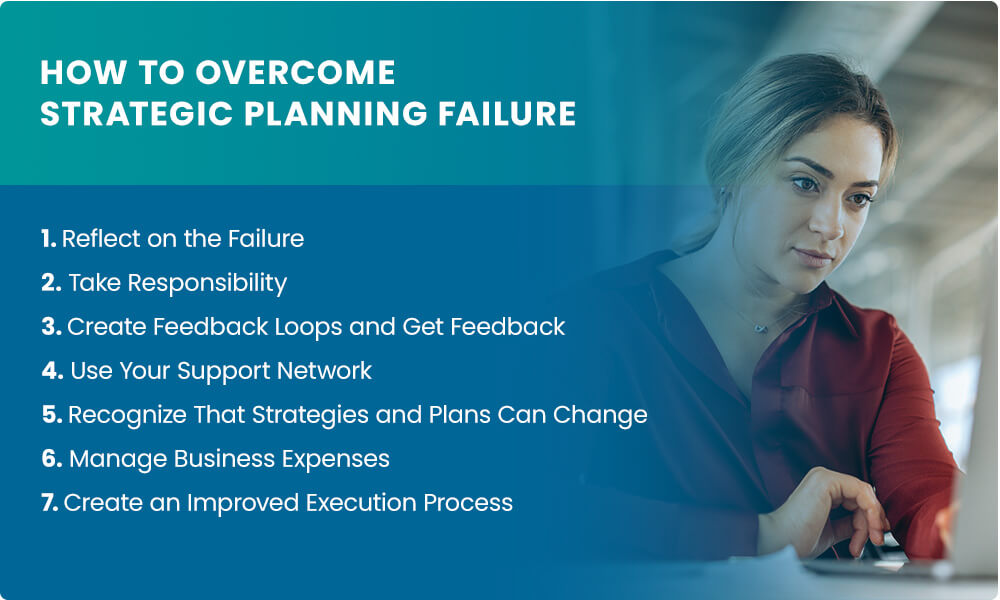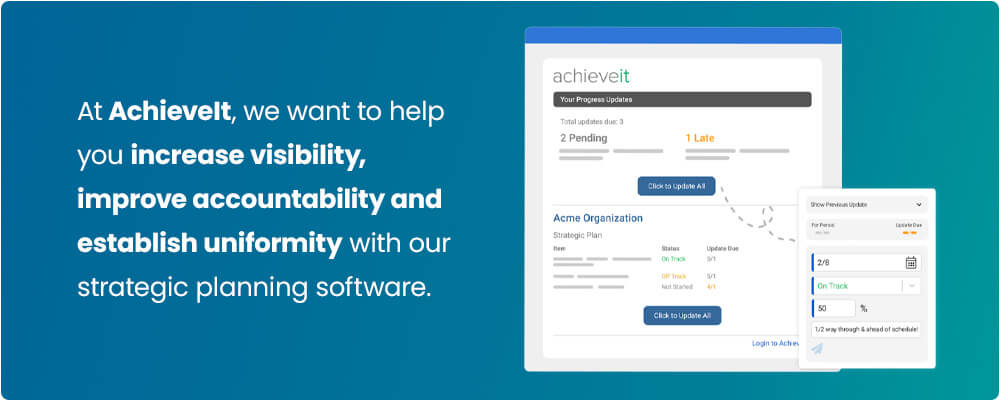There are more than 30 million small businesses in the U.S. If I asked you to divide these companies into categories based on annual revenue, how many would fall into the $1-10 million revenue tier? How about $10-50 million or above $50 million?
These businesses comprise only about 4% of those in the U.S. The remaining 96% have less than $1 million in annual revenue. Unfortunately, only a small number of them will grow into the next tier. In fact, it’s so hard to move between categories, there are only 17,000 businesses with more than $50 million in annual revenue. Only 17,000 out of more than 30 million!
It leads you to wonder — why do some companies struggle while others blast through the ceiling and achieve phenomenal growth? What are common barriers that prevent companies from achieving this level of growth? The secret often lies in strategic planning.
In this article:
- Top 28 Fatal Strategic Planning Program Flaws
- How to Overcome Strategic Planning Failure
- Start Executing Your Strategic Plan With AchieveIt
Top 28 Fatal Strategic Planning Program Flaws

For some companies, strategic planning seems to be a rhetorical exercise in which everyone fills out a form at the beginning of each year listing the things they are going to accomplish. The forms are assembled into a tidy document and updated quarterly. It’s all very task-oriented. And while, yes, strategic plans contain tasks, without goals, objectives, and strategies to provide context, the tasks are meaningless. A strategic plan without measurable objectives is no strategic plan at all.
Successful strategic planning means business elements are working together agreeably to contribute to these goals. For strategic planning to be successful, you need to understand the factors that play a role in strategic plan failure. We’ve gathered a list of the top 28 reasons why strategic plans fail.
1. Premature Upscaling
Pushing your business outside of its limit is known as premature upscaling and may occur if you are impatient to implement a business venture, project, or strategy. Preparing your team to take on any kind of expansion before anticipating possible consequences can lead to disaster. Managing the effectiveness of your strategic plan means not taking it beyond the reality of what your business can handle.
A practical internal organization should focus on a steady upscale by defining specialized roles, strengthening management structure, planning, forecasting, and sustaining culture.
2. Poor Managerial Skills or Lack of Leadership
Managers and leaders can heavily influence productivity, revenue, innovation, and turnover. Management that contributes to a lack of trust or low expectations can decrease employees’ motivation or performance, which can affect strategic planning. Managers can assist in creating a proactive environment by learning from their failures and encouraging experimentation. Promoting open communication and exchange of ideas may also help with improvement opportunities.
Managers should be aware that employees may not always come to them when problems arise, so anticipating problems and engaging with employees to create solutions for strategic plans lets your team know they are a priority. Having suitable leadership can ensure your team’s commitment and buy-in to the process.
3. Zero Succession Plan
Many strategic plans are not executed well because the business doesn’t have a succession plan. A succession plan ensures the necessary resources and skills are available when needed for a business plan or transition. The absence of succession planning may leave your business exposed to inefficient replacement options for positions that need to be filled, as well as fewer training and opportunities for your hard-working employees.
Businesses with a strong succession plan may see more resolved conflicts, effective decision-making and a boost in employees’ qualifications to take over specific roles.
4. Overwhelming Strategic Plan
A strategic plan that is too overwhelming may be just as ineffective as having no plan at all. Too many vague goals or action steps — such as “growth” or “increased revenue” — can create confusion and dilute specific instructions or paths to accomplishment. This lack of precision could make employees less likely to make progress on goals. A strategic plan can also seem overwhelming if it aims to accomplish too many objectives at once, making it more difficult to translate them into useful measures.
Creating a specific plan with goals and means of achieving them may reduce the likelihood of concerns or the need for clarification in the future. Using specific objectives can help you develop a reasonable timeline for intended success. It may also assist your employees in feeling confident in their respective roles and positions.
5. Unrealistic Goals: All Vision, No Direction
Setting unrealistic goals may explain why your business strategy fails. Unrealistic, immeasurable, or unquantifiable aspirations can be difficult to put into action and contribute to a lack of organizational focus because employees may find it unmanageable to meet the requirements. Employees are more motivated by challenging but attainable and incremental goals that align with business resources and productivity.
Aside from envisioning your goals, you need a plan for implementing them. So, after ensuring all the essential elements of your mission are accounted for in your goals, develop a plan for implementing them. This ensures your plan has a focused vision and a sense of direction.
6. Focus on Structural Changes
A business that puts too much focus on structural changes may lose the opportunity to direct its energy toward decision-making and meeting goals. Rather than building new structures, it is important to work on developing effective processes for strategies. Structural changes may bring about more issues and conflicts that take away attention and time from the strategies that can help your business succeed.
There are often limits to structural changes in organizational design, as it can take a long time to get everyone on board with the process to run smoothly.
7. Lack of Empowerment
The formulation and execution of your business strategy may depend heavily on your employee’s confidence and positive thinking. Empowered employees may feel more motivated to collaborate and achieve a goal, which can have a direct impact on your strategic planning success. Leaders who implement empowerment may see an increase in connection and creativity. Developing an inspiring and innovative environment can increase adaptation to different work styles, which may lead to success.
8. Wrong Timing

A solid business plan considers when the time is right to administer action. Your business strategy may be equipped with the proper resources, planning, goals, and actionable measures. But if the timing in your market or industry is not optimal, it may be wise to contemplate implementing it at a different time. The timing of your project often directly relates to success, so finding the ideal moment to bring your plan to life is important.
9. Short-Term Planning and Losing Sight of Goals
In the hustle of day-to-day operations, employees may easily lose sight of the mission. This attention can hinder short-term goal planning when your employees only focus on daily activities rather than their purpose in the overall goal.
Before establishing your business strategy, think about the big picture and general direction of where you want to grow. If you don’t set long-term goals, you may lose the ability to envision sustainability. Setting long-term plans and objectives can improve your short-term goals’ structures because you may be able to narrow the focus toward what you are trying to achieve.
Most of the time, your business’s short-term goals will be very different compared to its long-term strategy, so you and your team should revisit goals regularly to keep everyone on track. Planning for your business’s future and adapting your daily actions to your strategic plan’s goals can strengthen your employees’ ability to maintain a broader perspective.
10. Choosing the Wrong People or Relying Too Much on External Consultants
In any business, the employees and team members are the most important asset. Every business strategy, plan, and execution stage requires different skills, personalities, and capabilities. Choosing the wrong people to fill specific roles in your business plan may decrease productive methods and success.
A team of external consultants is almost always a good idea for collaborating on a business plan and ensuring success because strategic management decisions can be very challenging. However, strictly relying on external consultants, meaning those who are not a part of your business, may lead you to lose sight of your business goals and purpose. After all, no one knows your business better than the people involved in your internal organization.
The external structure, also known as the environmental subsystem, should interconnect with the internal structure of your business to maintain consistency and work to improve intended progress. Internal consultants may be more beneficial for your business, depending on the size of your project or business plan. They may have a better idea of how to allocate resources and take a specific approach.
11. Lack of Communication or Lack of Clarity on Actions Required
When strategies fail, it is often because of a lack of communication. Communication keeps everyone on the same page. To communicate effectively, you must understand what information is relevant and important when notifying your team of updates, issues, or changes on a project.
In businesses where a lack of communication contributes to the limitations of strategic planning, employees may feel confused about their roles and responsibilities. They may also feel disconnected when attempting to collaborate, which can lead to poor execution and confusion on context and outcomes. A method of storytelling can be effective in this case to put facts, strategies, missions, or operational planning directives into a structure that people can relate to and understand.
Another crucial part of communication is accountability. Around 91% of employees would say effective accountability implementation is one of their company’s top leadership development needs. Clearly communicating what employers are accountable for is essential, considering 60% of workers report higher levels of mistrust with leadership when faced with a lack of communication surrounding accountability.
12. Inadequate Monitoring
Monitoring the development of planning and progress for any strategy can keep you aware of when changes need to be made. Determine which factors will have a significant impact on the success of your business to create a timeline of when critical tasks need to be completed. Proper monitoring allows for the opportunity to notice alternative solutions and predict long-term performance. Keeping your strategies and objectives on track may help prevent problems and enable you to revise or update plans as necessary.
Monitoring your financial key performance indicators (KPIs) is another great way to be proactive and add value to your daily activities.
13. No Progress Reporting
Reporting progress is another effective means of communication that contributes to staying on track with meeting your goals. A progress report updates the right people on the status of certain projects or task completion. Without it, there can be confusion and concern surrounding productivity.
Progress reporting can also provide an overview of your team’s accomplishments and areas that need improvement. Constructing a regular analysis of your team’s performance, spending and profits can provide insight into how you compare with competitors.
14. Lack of Alignment
Strategic alignment means that all crucial elements of a business are working together to support long-term goals. If employee performance is not aligned with your company goals and important strategic plans, it may present another obstacle to success. Misalignment in your business can create a disruption in focus, unclear goals, and conflicting tasks.
Employees need to understand how their responsibilities fit into the success of a strategic plan or mission. Creating clear, established intentions may help you develop alignment with what your business aims to accomplish.
15. Strategy You Can’t Execute
Before wasting time, energy, and resources on a strategic plan, consider if it is truly worth executing. Vague ideas or goals won’t usually produce anything successfully, so analyze your plan to see if it is capable of creating real change. Your strategy should be flexible and leave little opportunity for disruption.
Your business may be too focused on seeing rapid results that it may not take the time to develop capabilities and innovation techniques. A worthy, solid strategy will take time to develop and may even require fundamental changes to your business.
16. Unforeseen External Circumstances
Unpredictable occurrences should, ironically, be expected. If your company is not comfortable with confronting unforeseen external circumstances, it may explain why your strategies fail. Learning to anticipate risks or unfavorable opportunities can strengthen your ability to prepare a more secure strategy in the future. It is wise for your business to continually adapt its resources to suit a changing environment.
Leaders and managers should devise a plan that highlights any uncertainties or possibilities for changing demands and competition to reduce the chance of failure from an external source.
17. Flawed Strategy
Implementing an incomplete or inconsistent plan is another possible reason why your strategic plans fail. A poor match between strategy and organizational core competencies may prevent you from seeing the growth and success that you desire. Testing your strategy with logic and a discernable vision can help determine if there are flaws in your strategy and how to address them.
Look to past situations and failures to see where you might notice defects in your current business strategies. You may jeopardize your business’s advancement if you rush to execute a strategy that hasn’t been well thought out.
18. Allowing Planning to Kill Strategy

The planning process allows you and your employees to demonstrate the goals you have in mind and how they can be achieved. However, too much planning — or too much focus on it — might dilute the importance of your strategy execution. At some point, you need to shift the overall focus to the strategy itself and how it will be executed to meet the desired growth.
Many managers and leaders may take too much time during the planning process trying to perfect every tiny detail. While this is admirable, it can also cause a delay in getting your anticipated results. Strategy execution should not be confused with planning, as they are completely different parts of the process of strategic analysis. Planning usually consists of an organized list of initiatives with associated budgets, resources, and deadlines. The strategy involves implementing specific decisions that lead to sustainable competitive and financial advantages.
19. Disorganized or Poorly Written Plan
A poorly designed plan will most likely lead to poor execution, which may cause strategic plan failure. Sufficient research and development of a plan with expertise and direction can be a part of the process of refining and organizing it. A jumble of to-do lists that are not coordinated and have no stated objectives may only cause your team to take longer to come up with a proper arrangement. This is also where accountability comes in — Ensure team members understand their responsibilities.
20. Incremental Thinking
While incremental goals and growth may be a positive aspect of strategic planning, incremental thinking is usually not. This method of thinking usually consists of waiting for immediate, linear results and is generally unrealistic. It’s a more traditional process that may cause you to expect progress because you think you are making the right decisions.
Before implementing your business strategy, consider practicing an exponential mindset. Exponential thinking allows you to assess your growth in terms of its journey rather than overnight results. Exponential projections are not always certain and may not always meet your expectations as reliably as incremental thinking, but they focus on working differently instead of working better. You can practice patience and alignment in your business, bringing about the opportunity for innovation.
21. Insufficient Focus
Another fatal flaw in strategic planning is insufficient focus. Employees who have too many widespread tasks may not know what to prioritize or what objectives are most relevant. Staying consistent with communication and reflecting on your business’s values and mission can be a helpful reminder that keeps team members on track.
Leadership may also focus too much on internal issues that don’t relate to their goals, such as resolving conflicts and sustaining performance. Too much internal attention can mean leaders fail to acknowledge competition markets and trends in technology. Focusing on the necessary elements of your strategic plan is key to maintaining the dynamic in your business, but 70% of leaders review their strategy on an average of only one day a month. Spending too little time focusing on your prime concerns may lead to strategic failure.
22. Prioritizing the Wrong Things
While outlining specific priorities and goals is essential for strategic planning, it is crucial to prioritize the right things. Your priorities should directly align with your strategic business plan and have an obvious connection to how your company will succeed through particular steps and tasks. Explaining your priority objectives in detail and why they matter to your organization can help you understand if they truly are important.
It’s also normal for priorities to change throughout the process of implementing your strategic plan. Your goals may occasionally need to be restructured due to industry changes or financial impediments, so it’s a good idea to revisit your primary concerns regularly to see if they still match up with your current progress.
23. Insufficient Research
A lack of proper research may present problems down the line when executing your strategy. This type of research may include competitive industry markets, a review of your company’s resources or a look at your company’s financial performance. It is important to consider all possible elements of your strategic plan so you can better predict challenges and obstacles.
Strategic research planning can also be helpful to define the resource and budget needs and possible outcomes before beginning a project. Leaders who prioritize research help ensure that all the important elements of a plan are accurately measured and completed. Emerging industry trends and changes can also be identified and updated according to your business plans with appropriate research. A lack of research could lead to a deficient comprehensive strategic plan because of failure to highlight related interactions, pressure points, and dependencies.
24. Putting Financials Ahead of Ideas
Improper use of resources is another factor in the list of fatal flaws. Tracking financial performance keeps you prepared for unexpected or unplanned events. However, being so concerned with your cash flow that you neglect ideas that could grow your business can cause you to pause your business plan or scrap it altogether.
Consistent poor cash flow management can also prevent you from making impactful decisions, finding resolutions, and predicting a prospective financial outlook for your business. It may also keep you from being able to participate in new business opportunities. Staying on track with your finances and managing them sensibly may make it easier for you to take on new tasks and projects without seeing a depletion of resources.
25. Failing to Make Trade-Offs
Strategies require making decisions that are difficult but necessary. Making trade-offs is very common and essential in most businesses and involves choosing one option or action over another. This ensures that your revenue, time, energy, and resources are going to the tasks where they can make the most impact.
For example, if your employees work toward many different, widespread goals or missions, there may not be much progress on your primary strategic plan. Failing to make trade-offs can prevent you from being able to allocate your resources to your most important key projects and objectives. Trade-offs also allow you to determine which goals may conflict with each other, which risks you are willing to take, and which ones are not worth the possible loss.
26. Putting Too Much Value on Your Central Idea
Putting too much emphasis on one goal also has drawbacks. While it’s important that your team keeps your central idea or goal in mind, it should be flexible and adaptable. Having a backup plan can help add some security to your strategy and address concerns from your team.
It is also crucial to remember that strategies cannot be perfect, and leaders and managers can’t know every conceivable aspect of what may occur in the future. Putting all of your focus into one central idea will not give you much room to modify or adjust when issues arise or variables change.
27. Using Unrealistic Models
Setting unrealistic goals is another reason why strategic plans fail. Goals or models that seem unattainable may decrease motivation in your employees and slow productivity performance. Setting actionable, measurable goals can make your team feel like they can accomplish something while being challenged at the same time.
Your strategic planning models should be aligned with your intentions, but they should also be flexible. Your employees should be able to develop these ideas and results upfront and be equipped to face unexpected obstacles. Use common sense and intuition in the decision-making process to create realistic models and goals.
28. Failing to Link Strategic Planning to Strategic Execution
A solid strategy usually consists of adequate planning, organization, and delegation of tasks. To see success, you need to connect your strategic plan to your strategic execution. When managers or leaders become strictly reliant on their strategic plans, it may become more difficult to adapt to the external environment due to increased rigidity and inability to emphasize action.
Failing to link strategic planning to strategic execution may also decrease innovation. Innovation is a common link between strategy and performance, which may help you keep that connection when moving from the planning to the execution stage. Another part of this link may incorporate reviewing expected results and ensuring everyone stays engaged with the procedure and implementation process.
How to Overcome Strategic Planning Failure

Combatting any obstacle can feel like a challenge, but it can also show you how to strengthen your abilities and become more successful. Seeing your plans develop may reinforce your feelings of accomplishment, making you more confident and secure in your future strategies. Here are a few methods on how to overcome strategic failure and improve overall problem-solving in your business.
1. Reflect on the Failure
The trial and error process is vital to learning, growth, and success. In business specifically, it’s normal to encounter failure, and it’s something you’ll have to accept. Think of failure as an opportunity to learn, recover, and shift your mindset to your next steps.
Experiencing failure can supply you with the ability to become stronger and more knowledgeable throughout the entrepreneurial learning process. Research suggests that failure can give you a better lens for future-orientated learning outcomes. Applying and utilizing what you have learned from your past mistakes can help you generate an early warning system that allows you to anticipate ways to correct your actions.
2. Take Responsibility
As a leader, admitting you have made a mistake or could have done something better is not always easy. But owning up to the situation instead of blaming outside factors will make you appear more responsible. Being willing to embrace accountability rather than focusing on a victim mentality can make you more resilient in the future.
Taking accountability may even produce positive results, such as:
- Improved solutions.
- A boost in creativity.
- Employee commitment and participation.
- Employee morale and satisfaction.
If you struggle with taking responsibility, think about the impact it may have on your employees. Setting a good example and enforcing the importance of accountability will provide a more solution-oriented environment, especially in the wake of a strategic failure.
3. Create Feedback Loops and Get Feedback
It’s not always easy to hear or accept feedback from your peers. However, the value of feedback proves to be quite the opposite. If you struggle to appreciate the feedback process, know it can be essential for learning and developing at any stage of your career. When you receive knowledge and opinions from others, it can help you think of a new perspective or idea you hadn’t previously considered.
Creating an environment that encourages friendly but constructive criticism can have many benefits, including:
- Providing clarity for employees.
- Acknowledging the hard work and effort of others.
- Communicating what can be changed.
- Reinforcing and motivating employees with innovative ideas.
- Encouraging employees to review and adjust their goals.
Receiving advice should be seen as an opportunity to overcome areas of weakness. The Pendleton Model suggests that an action plan or specific goal should be the top priority when giving or receiving feedback. This model can refine the communication process — the more feedback you receive, the more you can think and reflect on the most efficient improvement methods.
4. Use Your Support Network
Building connections with people who have different opinions and perspectives is a great way to feel supported and manage stress. A study revealed that social support can improve psychological resilience when you are faced with stress, adversity, or failure. With a positive social support network around you, you may be less likely to:
- Engage in risk-taking behaviors.
- Feel socially isolated, which can lead to depression.
- Use or rely on negative coping mechanisms.
- Have negative thoughts about yourself or your abilities.
A team of motivational peers, friends, coworkers, or family members equips you with a sturdy structure for authenticity and encouragement.
5. Recognize That Strategies and Plans Can Change
The willingness to accept change is also something that requires effort and patience. To improve the culture of your business, organization, or practice, you must be open to change. This concept may seem difficult to implement if you are used to a specific structure, direction, or position. However, change is almost always a perfect opportunity to enhance productivity and efficiency.
When approaching change, it’s a good idea to think of it as you and your team conquering a challenge or creating a vision together. Celebrating the small wins, maintaining a positive attitude and staying focused on your goals will make embracing new and intimidating changes easier.
Venturing out into a new strategy or business initiative may cause you to long for the comfort of predictability and the traditional way of doing things. But change can also make you feel more empowered, strengthening your ability to adapt to your environment and make more conscious choices.
6. Manage Business Expenses
Staying on top of your business expenses can prevent you from dealing with financial problems in the future. Creating a money management plan can keep your payments and charges organized. Having control over your finances will save you time and energy that you can instead devote to your business strategy. Examples of managing your business expenses can include:
- Having a dependable payroll system.
- Hiring a reliable accountant to assess financial performance.
- Having an accounting or bookkeeping system.
- Regularly check your financial reports, such as income statements and balance sheets.
- Ensuring you are adhering to federal, state, and local tax regulations.
- Managing cash flow.
You will have one less thing to manage if your business expenses are handled by a credible, trustworthy professional.
7. Create an Improved Execution Process
Learning from past mistakes is a powerful tool for improving your future plans and initiatives. Individuals often resist change, which may present problems such as counterproductivity and ineffective job performance, which is why many strategy implementations fail.
Once you decide on your next step toward a goal, following up with attentive communication and follow-through is essential to staying on top of a successful strategy. A few steps to creating an improved execution process may include:
- Identifying critical vulnerabilities.
- Communicating priorities and success factors.
- Creating an outside perspective of your business.
- Considering financial impacts.
- Acknowledging competitors.
These steps may help clear up any miscommunication and create transparency within your business or organization. Knowing how to properly delegate and implement your vision and direction can be one of the most successful methods for overcoming failure.
Prioritize Your Business’s Success With AchieveIt’s Strategic Planning Solutions
Any successful business understands the importance of a well-constructed strategic plan. At AchieveIt, we want to help you increase visibility, improve accountability, and establish uniformity with our strategic planning software. Our strategic planning management platform will allow you to turn your strategic plans into reality by providing tools that ensure your key plans and projects progress. With our software, you can spend less time collecting updates and more time making decisions to move your organization forward.
If you want to improve the way you execute your strategic business plans, contact us today or schedule a free demo to see how we can help you achieve more.




